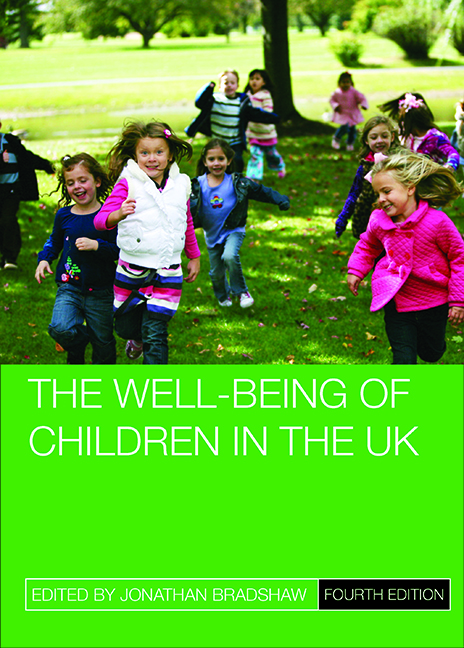Book contents
- Frontmatter
- Contents
- List of figures and tables
- List of abbreviations
- Notes on contributors
- Acknowledgements
- One Introduction
- Two Demography of childhood
- Three Child poverty and deprivation
- Four Physical health
- Five Subjective well-being and mental health
- Six Education
- Seven Housing and the environment for children
- Eight Children’s time and space
- Nine Children and young people in care and leaving care
- Ten Child maltreatment
- Eleven Childcare and early years
- Twelve Children, crime and correction
- Thirteen Conclusion
- Bibliography
- Index
Four - Physical health
Published online by Cambridge University Press: 01 September 2022
- Frontmatter
- Contents
- List of figures and tables
- List of abbreviations
- Notes on contributors
- Acknowledgements
- One Introduction
- Two Demography of childhood
- Three Child poverty and deprivation
- Four Physical health
- Five Subjective well-being and mental health
- Six Education
- Seven Housing and the environment for children
- Eight Children’s time and space
- Nine Children and young people in care and leaving care
- Ten Child maltreatment
- Eleven Childcare and early years
- Twelve Children, crime and correction
- Thirteen Conclusion
- Bibliography
- Index
Summary
Key statistics
• Infant mortality rates in the UK remain relatively high compared to other rich countries. Northern Ireland has a higher infant mortality rate than the rest of the UK.
• Low birth weight births are also higher than in comparable countries, and this appears static over time.
• The child mortality and child accidental death rates are comparatively low and similar across the constituent countries of the UK.
• Immunisation rates for infectious diseases are slightly lower than in other rich countries, particularly for measles, mumps and rubella.
• Breastfeeding rates remain low.
• With the exception of physical exercise, most health behaviour is comparatively poor.
• Rates of sexually transmitted diseases are high, but this may be affected by recent campaigns to increase the take-up of screening.
• The UK failed to meet its target on teenage pregnancy, but the rate has been falling rapidly since 2008.
• Self-assessed health is comparatively poor.
Key trends
• The long-term downward trend in infant and child mortality continues, and the infant mortality rate for 2013 is the lowest ever recorded.
• The social class gap in infant mortality has been increasing over the last decade.
• Cancer has overtaken accidents as the main cause of child deaths.
• Immunisation rates are recovering, but there have been epidemics of measles and mumps.
• Breastfeeding rates have improved very slightly.
• The incidence of deaths and serious injuries on the roads has continued to decline.
• Health behaviour has been improving. The exception is early sexual activity, although teenage conceptions have fallen rapidly since 2008.
• The upwards trend in sexually transmitted diseases may be levelling off.
• There is tentative evidence that obesity rates may be falling.
• Self-assessed health has been improving.
Key sources
• Office for National Statistics (ONS)
• Health and Social Care Information Centre (HSCIC)
• Health Survey for England (HSE)
• OECD Health database
• Health Behaviour of School-aged Children (HBSC) study
• Department for Transport (DfT)
• Child and Maternal Health Observatory (CHIMAT)
Introduction
This chapter focuses on the physical health of children and their health behaviour (subjective well-being and mental health are covered in Chapter Five).
- Type
- Chapter
- Information
- The well-being of children in the UK (4th edition) , pp. 71 - 122Publisher: Bristol University PressPrint publication year: 2011



